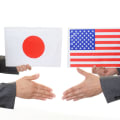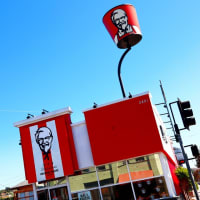Dali I’m confused.
ダリちゃん 混乱してるんだ
Me About what?
私 何に?
Dali A uniquely Japanese phenomenon.
ダリちゃん 日本ならではの現象に
Me You fool! What are you talking about?
私 バーカ! 何言ってるかわからないよ。
Dali Sometimes, when I am watching Japanese television, there are advertisements. We call them commercials. What do you usually call them?
ダリちゃん 時々ね、わしがテレビを見ているとき、広告があるでしょう? わしらはコマーシャルと呼んでいる。イナちゃんは普通、何と呼んでる?
Me “CM.”
私 CM。
Dali Yes, “CM.” What does “CM” stand for? Do you know?
ダリちゃん そう、CM。CMとは何を表すのですか? わかります?
Me I don’t know.
私 知らない。
Dali Commercial message.
ダリちゃん コマーシャル・メッセージ。
Me Hmm…Do you usually use this expression?
私 ふ~ん。この表現、よく使う?
Dali No, never! I don’t think even intelligent Americans realize that the Japanese usage of “CM” is the abbreviation of “commercial message.”
ダリちゃん いや、絶対ないね! インテリのアメリカ人でも日本人がCMと言ってるのがコマーシャル・メッセージの略だってこと知らないと思うよ。
Me So what do you call CM?
私 じゃあ、CMのことなんて呼んでるの?
Dali Commercial. I don’t like watching television, but I am forced to watch it because my wife likes to watch it very much. So the television is always on in my house. At times, there is a commercial break, and some commercials pop up. Maybe it’s, for example, Takemoto-piano. So it starts with “Piano-utte Choidai. Min-na-maaruku Takemoto-piano." And the ending is “Sono-toh-ri.”
ダリちゃん コマーシャル。わしはテレビを見るのは好きじゃない。でも家内がテレビを見るのが大好きだから無理やり見ざるを得ないんだ。だからうちではテレビはいつもつけっぱなし。ある時、コマーシャルブレイクがあって、あるコマーシャルが飛び込んで来るんだ。例えば、タケモトピアノ。で、「ピアノ売ってちょうだい。みんなま~るくタケモトピアノ」で始まる。それで、エンディングは「そのと~り」。

Reiko, watching TV
Me Funny!
私 おもしろ~い!
Dali But surprisingly, after the commercial concludes, it starts again. The same commercial begins again. The identical commercial is repeated! So the Takemoto-piano company pays for commercial time for the two identical commercials, running one right after the other! It’s a waste of money! Have you ever seen this?
ダリちゃん でも驚くことに、コマーシャルが終わると、もう一度始まるんだ。同じコマーシャルがもう一度始まるんだ。同一のコマーシャルが繰り返されるんだ! ということは、タケモトピアノの会社は一つ終わったらそのすぐ後に放映される2本のまったく同じコマーシャルの時間のためにお金を払ってるんだ! お金の無駄! 見たことある?
Me I don’t know…
私 さあ……
Dali It makes no sense!
ダリちゃん まったく理解できないよ!
Me I don’t think such CMs are common.
私 そんなCM、珍しいと思うな。
Dali No!! It’s common because I saw it yesterday. I saw it this Wednesday, also. The company pays double for the double time, with no extra benefit. So if I see the Takemoto-piano commercial and think, “I want to get a piano, maybe Takemoto,” and then the commercial ends, I think I will consider it. But when I see the Takemoto-piano commercial again, a second time, immediately after the first one, I may think, “No, not Takemoto. Maybe another less annoying company.”
ダリちゃん 違うよ! よくあるよ。だって昨日見たもの。今週の水曜日にも見た。その会社、2倍の時間のために2倍払うんだ。見合うだけの利点もないのに。で、わしがタケモトピアノのコマーシャルを見て「ピアノが欲しいな。たぶんタケモト」と思って、それでそのコマーシャルが終わるとすると、わしはタケモトピアノを考慮しようと思う。でも、タケモトピアノのコマーシャルを再度見たとき、2度目、初めのが終わった直後に、わしは「いや、タケモトじゃない。もっとウザくないほかの会社がいい」と思う。
Me The company felt a double commercial might be cost-beneficial, but it, in fact, results in the opposite effect.
私 その会社は2倍のコマーシャルが費用に見合う効果があると思ったのだけど、実際は逆効果だね。
Dali Yes, they indeed caused the opposite effect. To have to listen to or watch the same commercial two times in a row, one right after the other, is annoying. A commercial should be exciting or fun to watch. And watching it one time is enough. But immediately after, if it’s played again, it’s boring! It presents no additional information. So it has a negative effect. But the company thinks it will be worth paying for the double identical commercial. This is stupid. I have never seen such a phenomenon in the US.
ダリちゃん そう。彼らは実際、逆効果になっちゃったね。同じコマーシャルを続けて2回、1つ終わったその直後に見たり聞いたりするのはウザいね。コマーシャルは見てワクワクして楽しくなきゃね。それに見るのは1回で十分だ。でもね、1つ終わった直後に再度放映されるのにはうんざりするんだよ! 何も追加の情報を与えてくれない。だからマイナス効果だ。でもその会社は同じコマーシャルに2倍のお金を払うだけの価値があるだろうと思っている。滑稽だね。アメリカではそんな現象見たことない。
Me Oh, that was very educational! Thank you.
私 ワー、とても勉強になったよ! ありがとう。
Dali Here's one more example: I like to go to Ikebukuro to eat at an izakaya or a sushi bar. I get off the train and walk along the platform, and some posters advertising things are on the bulletin board. Surprisingly, I often see the same signs on a long signboard. They have put up ten or twenty identical posters right next to each other, even though they must pay for the entire billboard. What a waste of money!
ダリちゃん もう1つの例。わしは居酒屋やすし屋に食べに池袋に行くのが好き。電車を降りて駅のプラットホームを歩くと掲示板に広告のポスターが貼ってあるよね。驚いたことに、長~い看板に同じ広告がされているのをよく見る。10から20枚の同じポスターが隣同士で貼ってあるんだ。看板全体の代金を払わなきゃならないのにね。すごいお金の無駄!
Key words(キーワード)
in a row: 連続して、続けて、続けざまに
confused: 混乱した、ごちゃごちゃの、途方に暮れた、あわてた、困惑して、まごついて
uniquely: 独自に、比類なく
phenomenon: 現象、事象、驚異(的なもの)、不思議なもの
advertisement: 広告、宣伝
stand for: を表す、表象する、の代わりとなる
intelligent: 理解力のある、知性のある、聡明な
realize: 理解する、悟る、了解する
abbreviation: 省略、短縮、省略形、略語
be forced to: ざるを得ぬ、ざるを得ない
commercial break: (テレビ・ラジオの番組に差し込まれる)コマーシャルの時間、コマーシャル放送のための番組中断(時間)
pop up: (ポンと音を立てて)跳びだす、(不意に)現れる、出現する
conclude: 結論を出す(下す)、(話や会議が)終わる
identical: まったく同じ、同一の
on after the other: (二人・二物について)かわるがわる、交互に、(特定数のものが)次々に、順々に
extra benefit: 追加の利点
annoying: うるさい、迷惑な、じれったい
cost-beneficial: 費用対効果の高い
opposite: 反対側の、向こう側の、正反対の、逆の
indeed: 実に、実際に、まったく、なるほど、いかにも
immediately: 直ちに、早速、直接に、すぐ近くに
additional: 付加的な、追加の
negative effect: マイナス効果
educational: 教育(上)の、教育的な
platform: 駅のプラットホーム
bulletin board: 掲示板、広告版
signboard: 看板
billboard: (通例野外の大きな)広告版
broadcast: 放送する、放映する
presumably: 思うに、多分
enhance: 高める、増す
impression: 印象、感銘、気持ち、効果
mere-exposure effect: 単純接触効果(繰り返し接すると好意度や印象が高まるという効果)
psychologist: 心理学者
propose: 提案する、企てる
individual: 個人、人、人間
as a consequence: 結果として、~の結果
turn against: ~と反対の方向に向きを変える、~に敵対する、~に不利になる
viewer: (テレビやイベントなどの)視聴者、見物人
advertiser: 広告主、広告者
Comments(コメント)
Dali said that the same TV commercial broadcasted twice in a row is unique to Japan. I found on the Internet that this is called “Nikai-date Commercial.” Presumably, the aim is to enhance the impression of the products on the audiences to increase sales. This may be based on the “mere-exposure effect,” proposed by a psychologist, Robert Zajonc, in which individuals show an increased preference for a stimulus as a consequence of repeated exposure to that stimulus. However, as Dali said, this could likely turn the viewer against the advertiser.
ダリちゃんは同じテレビコマーシャルが2回続けて放映されるのは日本独特だと言っていた。ネットでは「2階建てコマーシャル」と呼ばれているそうだ。おそらく、売り上げを伸ばすために視聴者に商品の印象を増強させるのが目的だろう。このことは心理学者ロバート・ザイアンクが提唱した「ヒトは繰り返しさらされた刺激の結果、その刺激に対してより好意的な反応を示す」という「単純接触効果」に基づくものである。しかしながらダリちゃんが言うように、これは視聴者が広告主に高い確率でそっぽを向きかねない。























